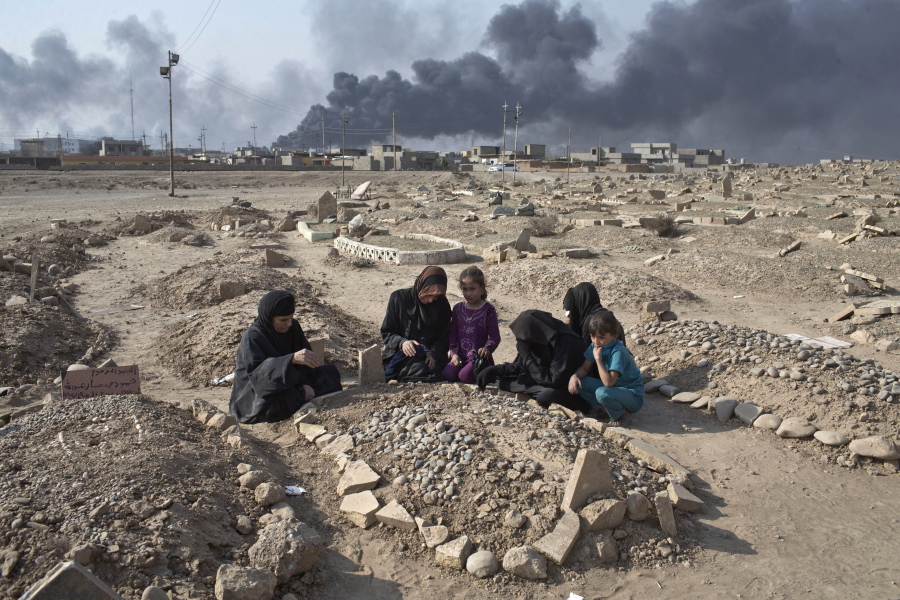QAYARA, Iraq — Sabriya Hammad buried her son in a cemetery that was destroyed by the same people who killed him.
Sitting on cardboard and surrounded by relatives, Hammad sobbed quietly over the mound of earth and rocks beneath a sky darkened by smoke from oil well fires set weeks ago by Islamic State fighters. The graveyard south of Mosul is littered with smashed headstones — also demolished by the militants.
“They destroyed everything,” Hammad said, looking out over hundreds of ruined headstones, some of them generations old.
Iraqi forces drove the extremists out of Qayara last summer as they pushed toward militant-held Mosul, the focus of an offensive launched Oct. 17. But months after the fighters withdrew, residents of Qayara are still coming to terms with the destruction left behind.
The militants began destroying the headstones shortly after they swept across northern and central Iraq in 2014. They said headstones were forbidden because they weren’t used during the time of the Prophet Muhammad. They also forbade anyone from visiting graves, which they view as a pagan practice.
The cemetery was marked by war long before IS arrived. It holds the bodies of those killed in suicide bombings, clashes and rocket attacks going all the way back to the U.S.-led invasion in 2003.
Hammad’s son, Muhammed, was killed weeks after Qayara was declared liberated, when IS launched a counterattack and a mortar round landed in front of his home.
Hammad has seven other relatives buried in the cemetery, somewhere under the jagged stones.
“When I see these destroyed stones on their graves, I feel grief, like they have died a second time,” she said.
Abdul Razak Tallab came to the cemetery to visit his sister-in-law, who was killed this month, also by an IS mortar round, and his brother, who was slain by a car bomb in Mosul in 2008.
When IS controlled Qayara, Tallab said, the extremists recruited him to drive prisoners to the graveyard to destroy the stones. Men who had been arrested for smoking or shaving their beards were forced to desecrate the graves of their ancestors.
His brother’s headstone was broken into pieces, obscuring his name and the dates of his birth and death.
But Tallab remembers.
He also knows the 18 men buried in a row of relatively new mounds.
“Daesh went door to door to shoot each of these men in their own homes,” he said, using an Arabic acronym for the group.
As the oil wells burned along the horizon, Tallab said his visits to the cemetery fill him with both sadness and peace. His loved ones are gone, but the gravestones that marked their lives can be fixed.
“We are just waiting for the situation to get better. Then we’ll repair all of them,” he said. “It’s a place that reminds you of the people who came before you and what they left behind.”



